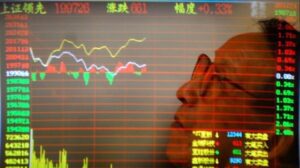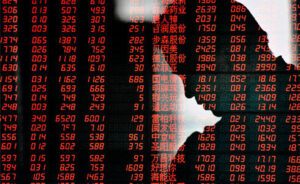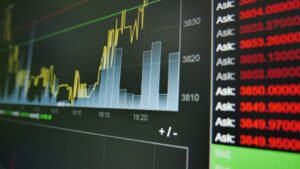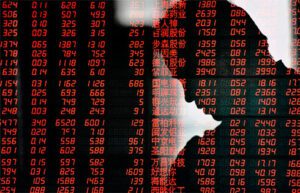
Stock indices of the Asia-Pacific region (APR) fall sharply during trading on Tuesday.
In particular, the pressure on the markets is exerted by the fall in the shares of the technology sector.
As reported, the US authorities last week introduced new restrictions on the supply of advanced chips and equipment for the production of semiconductors to China to prevent the development of the Chinese military industry through these products.
In addition, Asian markets are declining following the dynamics of Wall Street.
American stock indices fell on Monday for the fourth session in a row. At the same time, the value of the Nasdaq Composite fell to a minimum in more than two years – since June 28, 2020, according to Dow Jones Market Data.
The value of the Japanese index Nikkei 225 to 8:19 qoq decreased by 2.6%.
Japan’s current account surplus narrowed to 58.9 billion yen in August from 1.5 trillion yen in the same period a month earlier, according to Japan’s finance ministry. Analysts on average had forecast a surplus of 121.8 billion yen, according to Trading Economics.
Meanwhile, Japan’s services sentiment indicator rose 2.9 points in September from a month earlier, to a high since June of 48.4 points, according to Economy Watchers data.
Among the components of the index, Nidec Corp. shares are among the drop leaders. (-9.4%), SMC Corp. (-6.7%) and Yaskawa Electric Corp. (-6.2%).
The Hong Kong Hang Seng fell 2.2% by 8:25 qoq, the Shanghai Shanghai Composite – 0.2%.
Longfor Group Holdings Ltd. shares fell most significantly in Hong Kong. (-8.2%), Meituan (-7.2%) and Country Garden Holdings Co. Ltd. (-6.8%).
The South Korean index Kospi by 8:23 q decreased by 2.1%.
The value of shares of automaker Hyundai Motor fell by 4.8%.
Quotes of securities of one of the world’s largest manufacturers of chips and electronics Samsung Electronics Co. are down 1.4%, while shares of its rival LG Electronics are down 4.3%.
The Australian S&P/ASX 200 fell 0.3%.
The capitalization of the world’s largest mining companies BHP and Rio Tinto fell by 0.4% and 0.6%, respectively.

The stock indexes of the largest countries in the Asia-Pacific region (APR) mostly rose in trading on Thursday, with the exception of the Hong Kong indicator.
Optimistic statistics on the increase in the number of jobs in the United States, published yesterday, dampened hopes that the US Federal Reserve may slow down the pace of tightening interest rates, writes MarketWatch. This put some pressure on stock markets.
The number of jobs in the US private sector in September increased by 208 thousand compared to August, according to the ADP Research Institute. Analysts polled by Dow Jones estimated an increase of 200,000. In August, the number of jobs increased by 185,000, and not by 132,000, as previously reported.
Traders are now waiting for the US Department of Labor September labor market report, which will be released on Friday at 3:30 pm. Experts estimate the unemployment rate in the country last month at 3.7%, the same as in August, and the increase in the number of new jobs in the economy as a whole at 250,000, writes Trading Economics.
Market participants also evaluated the OPEC + decision.
Ministers of the OPEC+ countries at a meeting on Wednesday decided to reduce the alliance’s total oil production quota in November by 2 million bpd.
The Japanese Nikkei 225 rose 0.7% by the close of trading.
The Bank of Japan confirmed its view that most regions of the country are showing moderate economic growth. The regulator left unchanged the assessment of eight out of nine regions and improved the assessment for one region.
The growth leaders among the components of the index are the shares of the IT company Rakuten Group Inc. (+4.6%), Credit Saison Co. Ltd. (+3.3%), a credit card company, and pharmaceutical company Eisai Co. Ltd. (+2.9%).
Hong Kong’s Hang Seng fell 0.4%.
The drop leaders in the index are the shares of the pharmaceutical company Hansoh Pharmaceutical Group Co. Ltd. (-7.6%), automaker Geely Automobile Holdings Ltd. (-3.8%) and developer Country Garden Holdings Co. Ltd. (-3.6%).
Shares of Chinese lithium battery manufacturer CALB Co. completed the debut auction in Hong Kong, practically unchanged in price. The papers started trading at the level of the placement price, and then went into the red, where they were for the main part of the session, but by the close of trading they again returned to the level of 38 Hong Kong dollars ($4.84) per share.
Exchanges in mainland China are closed due to the National Day holidays.
The South Korean Kospi index rose by 1%.
The market value of one of the world’s largest chip manufacturers Samsung Electronics Co. increased by 0.5%, automaker Hyundai Motor – by 0.6%.
The Australian S&P/ASX 200 added 0.03%.
Shares of the world’s largest mining companies BHP and Rio Tinto increased by 0.6% and 0.2%, respectively.

Stock indices of the largest countries in the Asia-Pacific region (APR) show a significant rise on Wednesday morning amid speculation that the world’s central banks may abandon the overly aggressive tightening of monetary policy.
A positive impetus to Asian markets was given by the increase in US indices by 2.8-3.3% on Tuesday. Wall Street had the best start to the quarter since 1938.
Investors evaluate the incoming statistical data, which often turn out to be worse than forecasts, and regard them as signals of a slowdown in the global economy. As a result, the world’s central banks may moderate the pace of interest rate hikes, Trading Economics notes.
Yesterday, the Reserve Bank of Australia (RBA) surprised the markets by raising its key rate by 25 basis points (bp) instead of the expected increase by 50 bp. The Australian Central Bank raised the rate by 50 bp. in June, July, August and September, in an effort to slow inflation, which the Central Bank expects to peak by the end of 2022 at around 8%.
On Wednesday it became known that retail sales in Australia rose by 0.6% in August compared to July after rising by 1.3% a month earlier. The index has been growing on a monthly basis for eight months in a row.
Meanwhile, New Zealand’s central bank on Wednesday again increased the rate by 50 bp, to the highest since April 2015 3.5% per annum. As the minutes of the meeting showed, the Central Bank management also discussed the possibility of raising the rate by 75 bp.
In South Korea, consumer prices (CPI index) in September rose by 5.6% in annual terms after rising by 5.7% in August, although analysts did not expect a change.
“We expect inflation to accelerate again in October. Gasoline prices may continue to decline, but gas and electricity tariffs were raised in early October, and the cost of fresh food is likely to increase ahead of winter,” said ING analyst Robert Carnell.
The value of the Japanese Nikkei 225 index rose by 0.6%.
The growth leaders among the components of the index are the shares of Nippon Yusen (+2.6%), Fast Retailing (+1.5%) and Keyence (+1.1%).
On Tuesday, Japanese Prime Minister Fumio Kishida urged Japanese companies to continue raising employee salaries at a rate in line with the country’s inflation rate.
The Hong Kong Hang Seng indicator soared 6.1%. On the eve of the Hong Kong stock exchange did not work, and the day before the index fell to a minimum in 11 years.
Pork producer WH Group jumped 7.8% in Hong Kong trading on news of the sale of its US and Canadian spice business to Saratoga Food.
Market value of Shenzhou Intl. Group climbs 12.4%, BYD Co. – by 9.3%, JD.Com – by 9.2%, Ping An Insurance – by 8.8%.
Exchanges in mainland China are closed due to the National Day holidays.
The South Korean Kospi index is growing by 0.4%.
The market value of one of the world’s largest chip manufacturers Samsung Electronics Co. increased by 1.1%, automaker Hyundai Motor – decreased by 2%.
The Australian S&P/ASX 200 added 1.7%.
The growth leader is the IT sector. Block Inc rose 7.3%, Seek Ltd – 5.9%, Xero Ltd. – by 3.5%. Shares of leading Australian banks are rising by more than 2%.
Fortescue Metals gained 2% after the mining company promised to double its planned investment in its green energy division.

The stock markets of the largest states of the Asia-Pacific region are steadily growing on Thursday after falling the day before.
Asian indexes mainly follow the dynamics of the US stock market, which closed Wednesday’s trading higher amid attempts by the Bank of England to limit significant volatility in the bond markets. The Bank of England has decided to suspend the start of the previously announced government bond sale program and instead start buying government bonds amid a sharp increase in their yields.
The Japanese Nikkei 225 rose 1% by 8:15 a.m.
The growth leader is the shares of the pharmaceutical Eisai Co. Ltd. (+17.5%), musical instrument manufacturer Yamaha Corp. (+6.7%) and medical Shionogi & Co. Ltd. (+6.2%).
Meanwhile, retailer Nishimatsuya Chain Co. are down 8.2% after the company downgraded its full-year forecast, citing a declining yen and high costs.
The Chinese Shanghai Composite index rose by 0.36% by 08:20 Moscow time, the Hong Kong Hang Seng – by 1.1%.
Alibaba Group Holding (SPB: BABA) Ltd. is among the top performers on the Hong Kong Stock Exchange. (+4.3%), energy China Shenhua Energy Co. Ltd. (+3.3%) and Budweiser Brewing Co. APAC Ltd. (+2.6%).
At the same time, the share price of developer CIFI Holdings (Group) Co. (-22.1%) fell to its lowest level since the listing after reports that the company was having trouble financing its many projects in the city of Tianjin.
Electric vehicle manufacturer Zhejiang Leapmotor Technology Co. and divisions of China Vanke – Onewo Inc. started their debut trading in Hong Kong with a drop of 30% and 8%, respectively.
The South Korean Kospi index increased by 1.2% by 08:30 Moscow time.
Quotes of securities of one of the world’s largest manufacturers of chips and consumer electronics Samsung Electronics Co. grow by 1.4%, automaker Hyundai Motor – by 2%.
The Australian indicator S&P/ASX 200 has gained 2% since the market opened.
Shares of the world’s largest mining company BHP rose 3.1%, while the price of securities of another representative of the industry Rio Tinto increased by 1.6%.
Consumer prices in Australia rose by 6.8% in annual terms in August after rising by 7% in July, data from the country’s statistical office showed.
The slowdown in inflation is primarily due to the lower growth in fuel prices – by 15% in August compared to 43.3% in July. Food and beverage prices rose 9.3%.
The Australian Bureau of Statistics publishes monthly inflation data for the first time. The department previously released this report for the quarter. Experts explain this by the fact that inflation in the country has greatly accelerated over the past year and the rare publication of data complicates forecasting and decision-making by politicians and bankers. Third quarter inflation data is expected to be released on 26 October.

Stock indices of the largest countries in the Asia-Pacific region fall on Thursday following the US stock market.
Trading on stock exchanges in Australia on Thursday is not held in connection with the Day of Sorrow for Queen Elizabeth II.
Investors evaluate the results of the September meeting of the US Federal Reserve System (FRS). The American Central Bank raised the interest rate on federal funds (federal funds rate) by 75 basis points, now its range is 3-3.25% per annum. The decision coincided with the forecasts of most economists and analysts and was adopted unanimously by all 12 voting members of the FOMC.
Thus, the Fed raised the base rate by 75 bp. for the third meeting in a row. It is now at its highest level since the 2008 financial crisis. At the same time, based on Fed estimates, by the end of 2022 the rate will reach 4.4% per annum.
The Fed, along with many other central banks around the world, has been actively raising interest rates this year in order to slow down economic growth and curb inflation, beating multi-year records. Financial market participants, in turn, are worried that such actions could harm the growth of the global economy and provoke a recession.
Meanwhile, the Bank of Japan continues to stay away from the global wave of tightening monetary policy, despite increased inflation in the country. The regulator left unchanged the main parameters of monetary policy (MP) on the basis of the two-day meeting that ended on Thursday.
The short-term interest rate on deposits of commercial banks with the Central Bank was left at minus 0.1% per annum, the target yield on ten-year government bonds is near zero, the Japanese Central Bank said in a statement. The Bank of Japan also confirmed that it intends to keep the rate “at the current level or below.”
The value of the Japanese index Nikkei 225 by 8:15 Moscow time decreased by 0.6%.
The drop leader is shares of non-ferrous metal producer Toho Zinc Co. Ltd. (-2.95%), logistics Kawasaki Kisen Kaisha Ltd. (-2.7%) and recruiting Recruit Holdings Co. Ltd. (-2%).
Papers of the software developer Oracle Corp. (SPB: ORCL) Japan fell 5% after the release of its first financial quarter. The company’s net profit decreased by 3.8% on the back of rising costs.
The Chinese Shanghai Composite index fell by 0.2% by 8:20 Moscow time, the Hong Kong Hang Seng lost 1.8%.
Leading decliners on the Hong Kong Stock Exchange include shares of PC maker Lenovo Group Ltd. (-4.8%), IT company Alibaba Group Holding (SPB: BABA) Ltd. (-3.2%), operator of the Hong Kong exchange Hong Kong Exchanges & Clearing Ltd. (-3%) and JD.com Inc. (SPB: JD) (-2.9%).
The South Korean index Kospi by 8:25 Moscow time fell by 1%.
Shares of one of the world’s largest manufacturers of chips and consumer electronics Samsung Electronics Co. fell by 1.6%, automaker Hyundai Motor – by 1.8%.

Stock indices of the largest countries in the Asia-Pacific region ended trading on Monday with a fall on expectations of further tightening of monetary policy in the world.
Investors this week will follow the meetings of a number of central banks in the world. The US Federal Reserve System (FRS) will announce the rate change decision on Wednesday, the Bank of Japan and the Bank of England – on Thursday. Most experts believe that the US and British regulators will once again raise key rates to combat inflation that has been beating many years of records.
In addition, it is expected that meetings of the central banks of Switzerland, Sweden, Turkey and China will take place. The People’s Bank of China will announce the rate on loans to first class borrowers (LPR) for one year and five years on Tuesday.
At the same time, trades in the Asia-Pacific region were inactive on Monday. Stock exchanges in Japan are closed due to the country’s celebration of Honoring the Elderly Day.
China’s Shanghai Composite fell 0.35%, while Hong Kong’s Hang Seng shed 1%.
The shares of pharmaceutical companies Sino Biopharmaceutical Ltd. fell most significantly on the Hong Kong Stock Exchange. (-6.9%) and Wuxi Biologics (Cayman) Inc. (-5%), development Longfor Group Holdings Ltd. (-6%) and Country Garden Holdings Co. Ltd. (-3%), as well as IT companies Alibaba Group Holding Ltd. (-3.5%) and Netease Inc. (-3.6%).
Construction Paper China Vanke Co. Ltd. lost 1.2% in price. A division of the company – Onewo Inc. plans to list in Hong Kong and raise 6.15 billion Hong Kong dollars ($783.5 million).
The value of the South Korean index Kospi decreased by 1.1%.
Shares of one of the world’s largest manufacturers of consumer electronics LG Electronics Inc. shed 0.2%, while rival Samsung Electronics Co. rose by 0.3%. Capitalization of automaker Kia Corp. falls by 0.4%.
The Australian S&P/ASX 200 fell 0.3%.
The market value of the world’s largest mining company BHP fell by 0.6%. Oil companies Woodside Energy and Santos lost 1% and 0.8%.